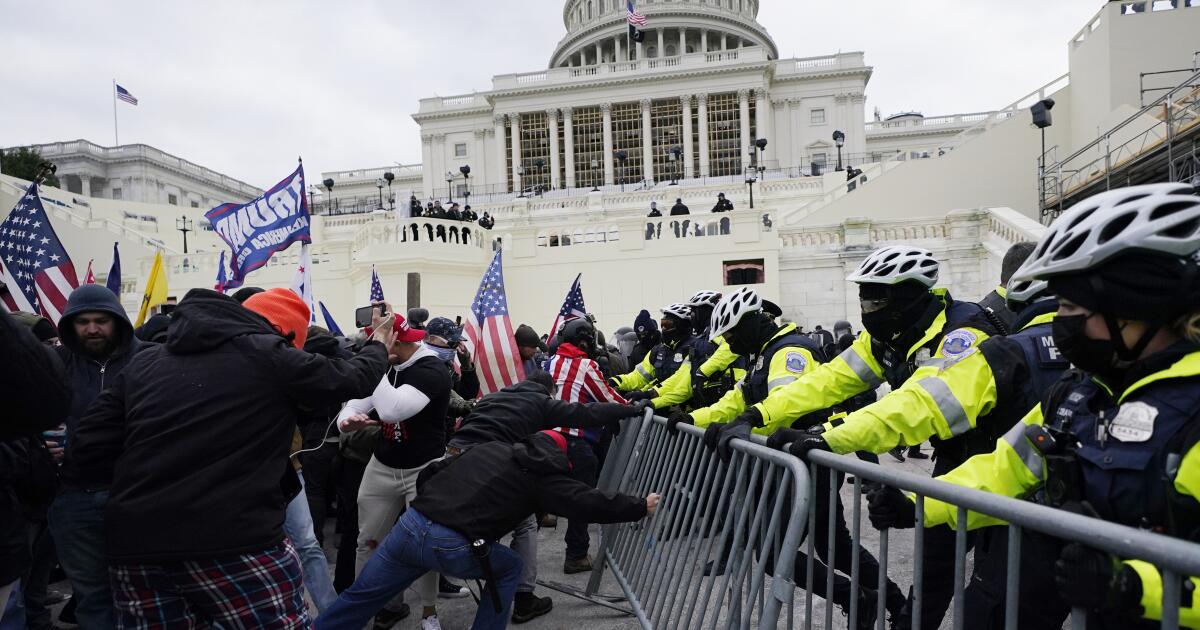The latest opinion denying a challenge to Donald Trump’s eligibility to run for president has occasioned a lot of teeth-gnashing about how the court, in the words of Colorado’s secretary of state, gave Trump a “get-out-of-jail-free card for insurrection.” The frustration is understandable but shortsighted.
In fact, the opinion by Colorado District Judge Sarah B. Wallace is a giant step toward disqualifying Trump from the ballot on constitutional grounds.
The Colorado challenge is one of several brought under Section 3 of the 14th Amendment, which disqualifies officials who “have engaged in insurrection” against the United States from holding federal office. The provision gives rise to the argument that Trump is not qualified to run for president because of his role in the events of Jan. 6, 2021.
In the last few of its 102 pages, Wallace’s opinion concludes that the president is not “an officer of the United States” for the purposes of the amendment and is therefore not disqualified from the ballot. Trump hailed this as “a gigantic court victory.”
But the former president was either bluffing or being obtuse. In fact, the opinion goes nine-tenths of the way toward recognizing the challengers’ claim and disqualifying Trump before opting for a close and questionable textual reading on the officer question. The ruling is far more important for how it goes against Trump than for the court’s final change of direction.
Every other court that has taken up the 14th Amendment claim to date has shied away from adjudicating it on the merits, finding it was a political question or otherwise unsuited for determination by the courts. The Colorado judge, by contrast, held a week-long evidentiary hearing, taking testimony on the law and the facts.
Wallace’s resulting opinion works methodically through the evidence to determine that Trump did indeed engage in insurrection, which only a trial court can do. In the process, she rejected Trump’s 1st Amendment defense, finding that his intentional incitement of the Jan. 6 marauders overcame any free-speech claim.
The order that will be appealed to higher courts thus has nearly everything that would be needed to disqualify Trump from the ballot. Its final flinch on whether the president is an officer is a discrete question of textual interpretation that any appellate court could decide differently.
The challengers’ brief, in fact, treated the officer issue almost as an afterthought, though a subsequent Wall Street Journal op-ed by former Atty. Gen. Michael Mukasey brought new attention to the question. And the conclusion that the president is not an officer has drawn ferocious criticism from eminent scholars, including the conservative former appellate Judge J. Michael Luttig, who called it “unfathomable.”
However weak or strong the claim — I don’t think it’s as ridiculous as others contend — the important point is that higher courts will decide it as a question of law. They may well disagree with Wallace on that point while adopting her far more important finding that Trump engaged in insurrection.
It’s widely assumed that any appellate ruling disqualifying Trump from the ballot would prompt intervention by the U.S. Supreme Court, which would have the final say. And it’s hard to imagine that the Supreme Court could or would make the determination that Trump engaged in insurrection without a factual record to review. In that way, Wallace’s opinion sets what had been an empty table for the court.
Of course, appellate courts could agree with Wallace on the officer question or differ with her on other legal grounds. A higher court could, for example, reject Wallace’s definition of insurrection as “any public use of force or threat of force by a group of people to hinder or prevent the execution of law” — an expansive definition based on a historical analysis of the term’s meaning during Reconstruction, when the 14th Amendment was adopted. Higher courts could also hold that enforcement of Section 3 is a political question that only Congress can answer, though that would raise other questions about the states’ power to ensure candidates meet other basic qualifications for the ballot.
The bottom line, however, is that the Colorado opinion gives the challengers what they needed most — a determination that Trump engaged in insurrection — while raising legal questions that the higher courts would have had to answer in any case. It thereby breathes new life into a potential legal solution to the Trump nightmare that might otherwise have remained quixotic.
Harry Litman is the host of the “Talking Feds” podcast. @harrylitman

